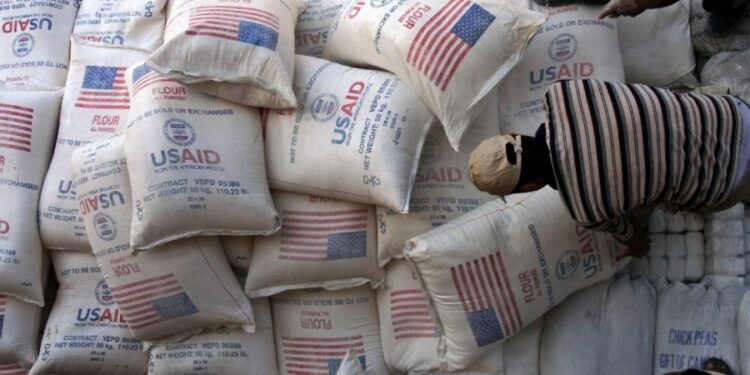
The future of U.S. global leadership hinges on more than military might or economic dominance. It is also the battle for the hearts and minds of people across the world. In short, soft power matters.
With U.S. foreign aid funding frozen and Secretary of State Marco Rubio now acting as administrator of USAID, Washington is reassessing its role on the world stage. The outcome is likely to reshape the very foundation of U.S. foreign assistance.
We have a bipartisan and urgent recommendation for policymakers in the Beltway: Artificial intelligence must become a pillar of U.S. foreign assistance.
AI is transforming industries, education, commerce and security worldwide. But expertise in AI remains concentrated in the hands of a few rich states, leaving developing countries at a disadvantage. The U.S. has the opportunity and the strategic imperative to bridge this gap.
AI can assist in disaster preparedness, streamline humanitarian responses and also help governments predict and mitigate risks. It can boost economic growth, improve public security and enhance governance. AI can be a force multiplier, offering the best return on investment for U.S. global engagement.
The U.S. is well positioned to lead in AI-driven foreign assistance. Without transferring sensitive technology, Washington can help allies craft AI regulations, training their government officials and sharing best practices for integrating AI into public administration.
The U.S. government has already deployed AI in countless ways — from optimizing supply chains to detecting fraud. These lessons can be invaluable to partner countries seeking to modernize citizen services.
The benefits are not just external. AI can also enhance the efficiency of U.S. foreign aid itself, automating internal processes, identifying wasteful spending and improving congressional oversight.
Beyond governance and development, AI is a strategic asset in the global competition for influence. The U.S. AI industry, projected to make trillions in investments before the end of the decade, thrives on network effects — the more users worldwide adopt American platforms, the stronger those platforms become. By expanding the adoption of its AI abroad, the U.S. can also shape global AI standards and regulations.
Soft power remains the United States’ not-so-secret weapon. A 2023 Gallup survey found the U.S. still enjoys a soft power edge over the People’s Republic of China in 81 countries. But that edge may be eroding. Hollywood, once a dominant force in cultural diplomacy, has seen its influence wane. While seven of the top 10 Chinese box office hits in 2012 were Hollywood productions, by 2023, not a single U.S. film made the cut.
In this shifting landscape, the remaining U.S. cultural ambassadors are its universities and technology giants. Silicon Valley — home to Apple, Google, Meta, Microsoft and OpenAI — still captivates global imaginations. Partnering with these companies to train young professionals abroad can help cement U.S. influence for decades to come.
AI is more than just a tool — it is a purveyor of values. Algorithms shape perceptions, beliefs, decisions and even moral frameworks. TikTok, the crown jewel of China’s soft power, influences global audiences through subtle algorithmic nudges. But AI goes further: It does not just expose users to content — it actively generates answers to their questions.
The United States must ensure that its AI technologies — built on principles of transparency, accountability and innovation — dominate the global market. If Washington fails to act, the AI leadership crown could pass to Beijing.
China understands the strategic importance of AI tools and policies. Over the past decade, Beijing has poured more than $1 trillion into the Belt and Road Initiative, expanding its infrastructure and digital footprint across 150 countries. AI is now embedded within the initiative’s ecosystem, backed by China’s state-controlled technology giants.
While China excels in hardware, the U.S. continues to dominate software. Until recently, Beijing’s AI efforts were largely domestic, with exceptions like TikTok. But the launch of DeepSeek, China’s large-scale AI model, signals a quantum shift. India, traditionally wary of Chinese apps, has expressed interest in DeepSeek. If the U.S. does not assert its AI leadership abroad, China will fill the void.
Rubio has outlined a clear litmus test for U.S. foreign aid: It must make the U.S. safer, stronger, and more prosperous. AI checks all three boxes. It enhances global stability, fuels economic growth and ensures that the United States — not China — sets the digital rules of engagement for the 21st century.
In a world increasingly shaped by AI, the United States must make it the cornerstone of its foreign assistance. AI is the key to winning friends and influencing countries in the 21st century.
James Cooper is a professor of Law at California Western School of Law in San Diego and Kashyap Kompella, CFA, is founder of RPA2AI Research, an AI analyst firm. Their recent best-selling book is titled “A Short and Happy Guide to Artificial Intelligence for Lawyers.”







